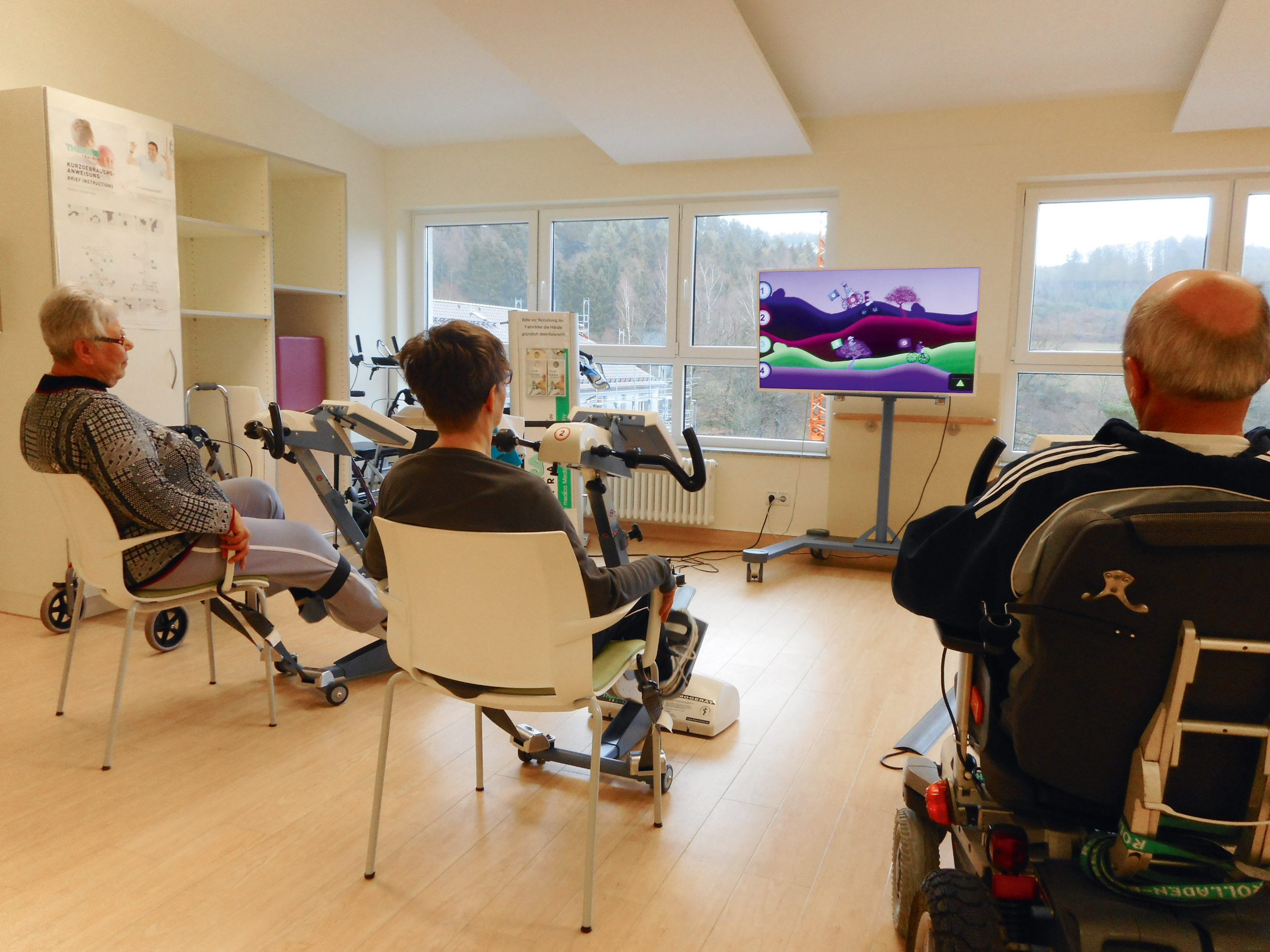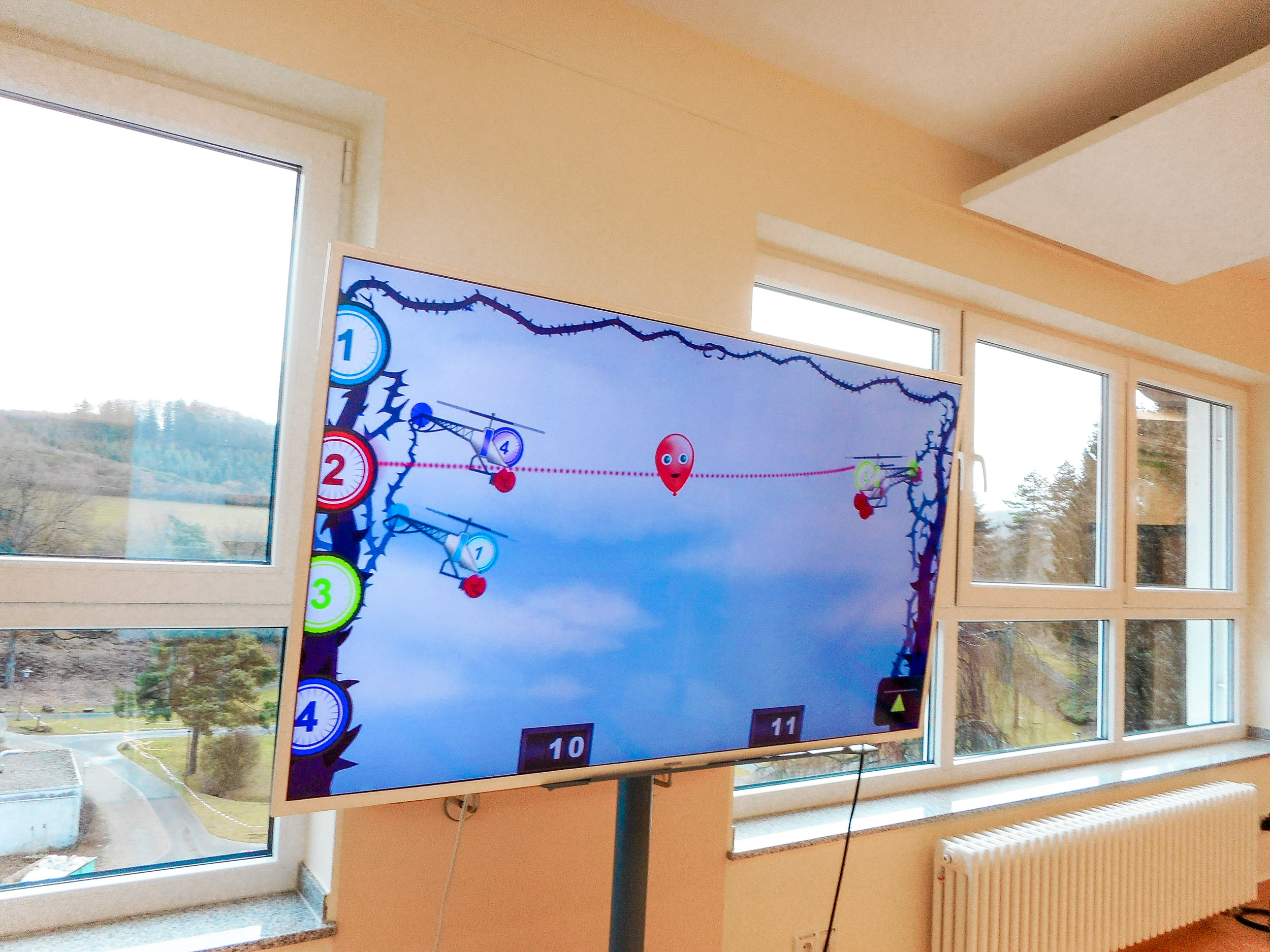
THERAPY-Magazin
Cycling successfully in a team
Discover how software-based cycling group therapy boosts motivation, reduces spasticity, and enhances social interaction in MS rehabilitation. A win for patients and therapists alike.

Melanie Schmitten
Physiotherapist, Clinic Sauerland Hachen
How can patients be treated optimally in neurological rehabilitation? With conventional or device-based therapy? In individual treatment sessions or better in group settings? Therapists from the Sauerland hospital in Hachen have found that device-based training in the group has positive effects, especially on MS patients.
The Sauerland hospital with 125 beds is an acute hospital in the hospital plan of the state of North Rhine-Westphalia. Over time, the Sauerland hospital has become one of the most important neurological special clinics for multiple sclerosis patients in Germany. Around 2,800 patients from all over Germany are treated in the Sauerland hospital every year.
The hospital's recipe for success lies in the combination of many years of experience and current know-how in a multidisciplinary treatment team. Over the years, doctors, nursing staff and therapists have developed into specialists in the treatment of multiple sclerosis and form an interdisciplinary team.
At the Sauerland hospital in Hachen we treat multiple sclerosis patients in specialised teams of doctors, nursing staff and therapists. The disease symptom spasticity can only be treated optimally and effectively in such a team. It would not be sufficient to treat pronounced spasticity in the legs with medication alone.
The hospital's recipe for success lies in the combination of many years of experience and current know-how in a multidisciplinary treatment team. Over the years, doctors, nursing staff and therapists have developed into specialists in the treatment of multiple sclerosis and form an interdisciplinary team.
At the Sauerland hospital in Hachen we treat multiple sclerosis patients in specialised teams of doctors, nursing staff and therapists. The disease symptom spasticity can only be treated optimally and effectively in such a team. It would not be sufficient to treat pronounced spasticity in the legs with medication alone.
At a glance Summarised
1. Software-based cycling group training for MS patients is evidence-based, can be precisely controlled and motivates patients to train while having fun.
2. Positive aspects of group training are fun, togetherness, the promotion of social contacts and thus more motivation, which often leads to higher repetition rates.
3. Both therapists and patients benefit from device-based group training.
1. Software-based cycling group training for MS patients is evidence-based, can be precisely controlled and motivates patients to train while having fun.
2. Positive aspects of group training are fun, togetherness, the promotion of social contacts and thus more motivation, which often leads to higher repetition rates.
3. Both therapists and patients benefit from device-based group training.
One of these therapies from the multidisciplinary treatment concept is medico-mechanical training in a group, also known as cycling. Since December 2017 we have been using the cycling equipment in combination with new THERA-Trainer software. Evidence-based, exact training control and playful motivation are just a few of the key words and reasons why therapists and patients alike enjoy working with it.
The therapy is structured in such a way that four patients practice simultaneously on movement exercisers connected to a computer. The devices can be used as arm or leg trainers and the level of difficulty can be individually adapted to each patient, so that even severely affected patients are able to participate in the training. You can also train in competition mode against each other or as a team.
The therapy is structured in such a way that four patients practice simultaneously on movement exercisers connected to a computer. The devices can be used as arm or leg trainers and the level of difficulty can be individually adapted to each patient, so that even severely affected patients are able to participate in the training. You can also train in competition mode against each other or as a team.
"Fun games where you forget the time."
As therapists, we can choose from three different biofeedback games in the software. You can also work with different settings for the severity levels. The "Helicopter" game, for example, goes above and beyond. The aim is to move the helicopter up or down by changing the rotational speed in order to keep a floating balloon in the air.
On a bicycle tour through the hilly Sauerland, patients have to pedal purposefully, evenly, rhythmically but also quickly. Patients can explore the most beautiful corners of Holland together. The computer calculates the average speed at which the video route is played.
Particularly positive aspects of the training for those affected include having fun and working together with others, which also encourages social contacts. Through this unconscious training, patients often achieve a higher number of repetitions than when they sit alone at a seat bicycle and mindlessly pedal. The games can be designed to be fair thanks to the individual adjustment possibilities and the patients are often positively surprised by what they were able to achieve while their focus was on something else. This often comes to light in particular after 20 minutes at the end of the group training when the patients can see their own evaluation. This also often motivates them to become more even, faster or stronger in the next session and to get further.
The games are not only easy to understand for fit patients, but also for people with cognitive deficits. In addition to promoting cognition, motivation and coordination, they also promote various muscle groups. The tasks can be performed in both forward and backward motion.
By training as a group, we can achieve high patient coverage in the therapy session. This makes it particularly attractive for us as a clinic. Due to the simple operation of the hardware and software, the workload for the therapist running the session is manageable.
A survey of a patient selection showed that cycling leads to more motivation due to the high fun factor. Many patients reported an improvement in pain, spasticity and range of motion over time. In the evaluations one could often see an increase of the driven distance and an improvement of the symmetry. Regular use has become very important for our patients.
All in all, cycling at our hospital is a therapy that no one wants to do without anymore.
On a bicycle tour through the hilly Sauerland, patients have to pedal purposefully, evenly, rhythmically but also quickly. Patients can explore the most beautiful corners of Holland together. The computer calculates the average speed at which the video route is played.
Particularly positive aspects of the training for those affected include having fun and working together with others, which also encourages social contacts. Through this unconscious training, patients often achieve a higher number of repetitions than when they sit alone at a seat bicycle and mindlessly pedal. The games can be designed to be fair thanks to the individual adjustment possibilities and the patients are often positively surprised by what they were able to achieve while their focus was on something else. This often comes to light in particular after 20 minutes at the end of the group training when the patients can see their own evaluation. This also often motivates them to become more even, faster or stronger in the next session and to get further.
The games are not only easy to understand for fit patients, but also for people with cognitive deficits. In addition to promoting cognition, motivation and coordination, they also promote various muscle groups. The tasks can be performed in both forward and backward motion.
By training as a group, we can achieve high patient coverage in the therapy session. This makes it particularly attractive for us as a clinic. Due to the simple operation of the hardware and software, the workload for the therapist running the session is manageable.
A survey of a patient selection showed that cycling leads to more motivation due to the high fun factor. Many patients reported an improvement in pain, spasticity and range of motion over time. In the evaluations one could often see an increase of the driven distance and an improvement of the symmetry. Regular use has become very important for our patients.
All in all, cycling at our hospital is a therapy that no one wants to do without anymore.
"It's nice to do something in a group and forget you're doing something. It stimulates and motivates."

Ambulante Rehabilitation
Cycling
Fachkreise
Produkte
Stationäre Rehabilitation
Therapy & Practice
THERAPY 2019-II
THERAPY Magazine
tigo

Melanie Schmitten
Physiotherapist, Clinic Sauerland Hachen
Melanie Schmitten is a physiotherapist who has been working at the Sauerlandklinik Hachen since 2007. She specializes in the treatment of multiple sclerosis and is part of an interdisciplinary team of approximately 30 professionals, including physiotherapists, occupational therapists, medical bath attendants, massage therapists, and speech therapists. In addition to treatments based on the Bobath, PNF, and Vojta approaches, she conducts robotics-assisted training and therapeutic climbing. Over the past few years, she has specialized in neurological therapy methods through numerous professional development courses.

Lara Baum
Physiotherapist, Clinic Sauerland Hachen
Lara Baum is a physiotherapist who has been working at the Sauerlandklinik Hachen since 2016. Her focus lies in the treatment of multiple sclerosis, and she is part of an interdisciplinary team of about 30 professionals, including physiotherapists, occupational therapists, medical bath attendants, massage therapists, and speech therapists. Her work includes treatments based on the Bobath, PNF, and Vojta approaches, as well as robotics-assisted training and therapeutic climbing. In recent years, she has specialized in neurological therapy methods through various professional development courses.
References:
Related contents
Find related exciting contents in our media library.
Mehr laden
This is not what you are searching for? Knowledge
Meet our specialists.
Are you interested in our solutions? Schedule a meeting with a Consultant to talk through your strategy and understand how TEHRA-Trainer can help you to advance rehabilitation.
You need to load content from reCAPTCHA to submit the form. Please note that doing so will share data with third-party providers.
More InformationYou are currently viewing a placeholder content from Turnstile. To access the actual content, click the button below. Please note that doing so will share data with third-party providers.
More Information